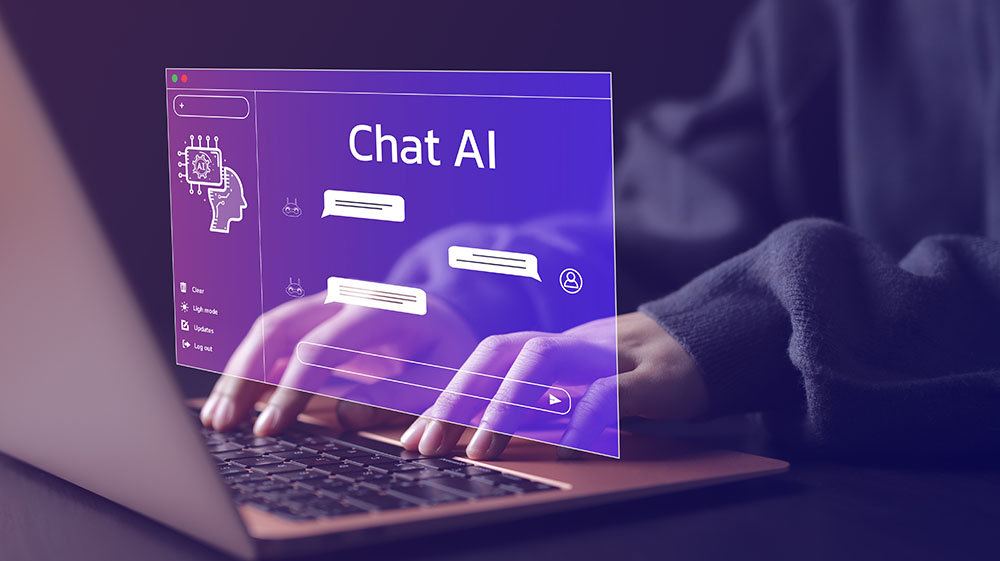
Todd Morgano | June 5, 2023
Everyone’s talking about AI. Which is why I was hesitant to share my thoughts on it. Who needs one more person on top of the pile of people pontificating about what artificial intelligence is going to do to us all?
But I’m alive here at the dawn of the age of AI. And I work in a field where it’s likely AI will have an outsized influence. So not thinking about it would be akin to not thinking about the Internet back in the 1980s.
I don’t claim to be an expert on AI. Most people aren’t. Even the people who invented AI will admit once they teach an algorithm to learn, they don’t fully understand the ways in which it learns.
Maybe that’s a good place to start. With what AI is.
What is artificial intelligence?
At its core, its algorithms that can manage unforeseen circumstances, will still function if fed unstructured data, and can think, learn and generate information on their own.
It’s the generation part that’s new. AI has been around for a while, predicting what kind of music we like, and helping our cars interact with their surroundings. But when it began participating in conversations that were eerily human – well, that got people’s attention.
It seems like AI can think. But it doesn’t really. It’s very good at scouring the vast Internet and using the human knowledge and interactions within it to respond to prompts by being very good at predicting the next word.
From that seemingly simple trick, it can spin out everything from a well-written article that explores the advantages and disadvantages of paying college athletes to creating code that can be used to disable someone’s computer system.
What’s different about AI this time?
To me, the fundamental shift with AI – besides it being so humanlike in the way it behaves – is that you don’t need specialized knowledge or skills to interact with it. You don’t have to be an especially good writer to have it write something well for you. You don’t have to be a whiz with Excel to have it sort and analyze data for you. You don’t have to be an expert at tax law, finance, SEO or any number of other disciplines to have AI produce work in that arena for you. You just need to know how to ask AI the right questions.
I’m exaggerating a bit – perhaps. AI may not be able to fully replace people in jobs where specialized knowledge has been required. But it could, down the road. Or it might enable us to do our jobs and live our lives better and more productively. It’s hard to say where this goes exactly.
There are very few areas of work and life that AI won’t disrupt. I’m not equipped to understand it all, but I’ve been experimenting with some forms of AI at work since it was made publicly available about a half-year ago, and I have a few thoughts on the benefits and drawbacks I’ve encountered and some further thoughts on its promise and the risks it also presents.
Let’s start with benefits.
What are the benefits of AI?
AI is terrific at helping me research topics, brainstorm ideas, analyze or summarize large amounts of information, look for patterns in data, write first drafts of blogs, social posts, ads, news releases, and all sorts of other communications. It can improve grammar, proof copy, and create graphics and videos – all incredibly fast and sometimes astonishingly well.
For instance, I recently told AI I was giving a talk about using AI in marketing and asked it to write some clever opening lines. Here are just two of the dozens of options it gave me.
- What do Netflix, Amazon, and Spotify have in common? They all use AI to create personalized experiences for their consumers. Now, imagine applying that same technology to your marketing strategy.
- Imagine having a marketing assistant that never sleeps, never gets tired, and never takes a day off. That’s the power of AI in marketing.
Not bad.
If you’re a marketer or communicator looking to brainstorm, strategize, gather intelligence, speed processes, automate rote activities, improve the quality of your work, and help you explore creative ideas, AI can be a huge help.
Here are some actual prompts I’ve used over the past few months that returned valuable insight.
- Give me 25 cool names for Company X’s new product based on the following copy explaining what it does.
- How does Company Y position itself in the market? What are its strengths and weaknesses? What are consumers saying about it online, in social, in chats, and in reviews?
- Which reporters are writing the most stories about Topic Z?
- Write an article in the style of Dwell Magazine on the top 10 home design trends for 2023 and incorporate these key SEO terms.
In each case, I was able to use what AI returned to improve the quality and speed of the project I was working on.
Ah, but there are some drawbacks.
What are the drawbacks of AI?
A lot of what AI returns can be basic and not all that creative.
For instance, when I asked for a sentence that describes what’s great about Falls & Company, it gave me this:
Falls and Company is a leading strategic communications agency specializing in crafting impactful messaging and executing comprehensive media campaigns for businesses seeking to enhance their brand reputation and engage audiences effectively.
Not altogether inaccurate. But it lacks originality.
Besides being basic, AI can also be dead wrong. Some of what it returns is factually inaccurate. It might plagiarize someone else’s thoughts or work. It could infringe on copyrighted material. It might include human biases (stereotypes, or worse, discrimination). It can also hallucinate. That’s the industry term used to describe what would otherwise be described as lying – or making things up.
In one recent experiment, AI was asked to cite which experts it used to write a particular article. And it did. Except the experts weren’t real. AI made them up. It found images of people and created bios for them. But they were completely fabricated.
In short, AI has a trust problem. And since its “thinking” occurs in a black box, we don’t know if the information it presents is accurate. If you think deep fakes and misinformation are a problem now, wait.
Which brings me to the doomsday portion of this article. Using AI in marketing and communications presents some huge risks.
- Will it be accurate?
- How will we be able to tell?
- Who owns the work?
- If AI makes a mistake, who’s at fault? Who might be sued?
- If AI causes damage, what are the repercussions? Who cleans up the mess?
What rules should I follow if I’m going to use AI?
There are no universally accepted rules for AI usage at the moment. Maybe because we’re early in the game and haven’t had time to fully think through what AI should and shouldn’t do for us. Or maybe we’ll always be grappling with that.
But here are some commonsense guidelines I use and have shared with those at my agency.
- Never pass along what AI returns to the outside world without vetting the information.
- Be transparent when your work contains elements generated by AI.
- Don’t assume the answers AI provides are all there is. It’s incomplete and is only one resource. If you ask AI to answer something for you, it’s just one take on the answer.
- You’re in charge of using AI, not the other way around. It’s an aide, not a crutch. Don’t rely on it to do your work for you. It likely won’t do it as well. And if it does, well, what’s the point of having you around?
There’s so much uncertainty surrounding AI, but one thing is for sure. It’s here. It’s already beginning to disrupt the status quo. And no one can accurately predict where it might lead us.
Should we be excited or scared?
Yes.


